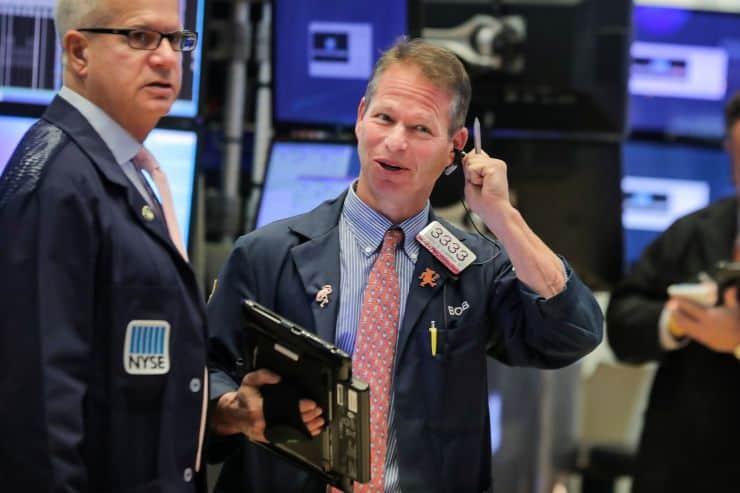
Stocks rose to notch a fresh record close on Monday, but the gains were muted as Wall Street remained cautious to start off the corporate earnings season.
The Dow Jones Industrial Average closed 27.13 points higher, or 0.1%, at 27,359.16. The S&P 500 ended the day just above the flatline at 3,014.30. The Nasdaq Composite advanced 0.2% to 8,258.19. The major indexes also posted intraday all-time highs earlier in the session.
Citigroup kicked off the earnings season by reporting second-quarter numbers that topped analyst expectations. Gains from the initial public offering of Tradeweb, an electronic bond trading platform, drove the bank’s results past Wall Street estimates. Citigroup shares traded higher in the premarket after the results were released, but quickly fell after the open to close less than 0.1% lower.
Other big banks like J.P. Morgan Chase, Morgan Stanley, Bank of America and Goldman Sachs are expected to report quarterly earnings later this week.
The outlook for this earnings season is bleak. Analysts expect S&P 500 earnings to have fallen by 3% in the second quarter, according to FactSet data.
“Low earnings expectations set up the possibility that announcements may surprise on the upside and provide a bounce in the stock market,” Bruce Bittles, chief investment strategist at Baird, said in a note. “However, investors will be weighing the good economic news and low interest rates against the earnings announcements, global slowdown and trade tensions.”
Monday’s moves come after the major indexes had a record-setting week. The Dow closed above 27,000 for the first time last week while the S&P 500 broke above 3,000. The Nasdaq also reached record levels.
“Trends have continued to show little to no signs of weakness and most stallouts have lasted a few days maximum before pushing back to new highs,” said Mark Newton, managing member at Newton Advisors. “Overall, ‘Risk-On’ looks still to be the most likely outcome between now and August when the possibility of a market top grows stronger.”
Stocks got a lift last week after Federal Reserve Chair Jerome Powell indicated during congressional testimony that an interest-rate cut could be on the horizon. His testimony largely confirmed what traders had been pricing in since the Fed’s June meeting.
Market expectations for a July rate cut of at least 25 basis points are at 100%, according to the CME Group’s FedWatch tool. Some traders are even betting on a 50 basis-point rate cut, the tool shows.
“Powell was a bit more dovish than the market had expected,” said Gregory Faranello, head of U.S. rates at Amerivet Securities. “Certainly, he solidified a rate cut for July at minimal.”
“He accentuated the negatives and discounted the positive,” Faranello said. “You can draw the conclusion that this will not be a one-and-done scenario for the Fed, but that remains to be seen.”
A rate cut would come at a time of slowing global economic growth.
China’s economic growth slowed to 6.2% in the second-quarter from a year earlier, its weakest pace in at least 27 years, as the trade war with the U.S. took its toll. Still, China’s gross domestic product growth was in line with expectations, and data for industrial production, retail sales, and fixed-asset investment came in above analyst expectations.
President Donald Trump commented on the Chinese economic data, tweeting that the slowdown in economic growth is “why China wants to make a deal.”
China and the U.S. have been engaged in a trade war for more than a year. In that time, the two countries have slapped tariffs on billions of dollars worth of their products. The U.S. has also targeted Chinese telecom giant Huawei, restricting U.S. companies from selling to the company.
Reuters, however, reported on Sunday that the U.S. may approve licenses for companies to restart new sales to Huawei within two weeks. The Wall Street Journal had reported that Huawei is planning extensive layoffs in the U.S. amid the struggle with its blacklisting.
Elsewhere, Symantec shares plunged more than 10% after CNBC’s David Faber reported the company ceased deal negotiations with Broadcom.
